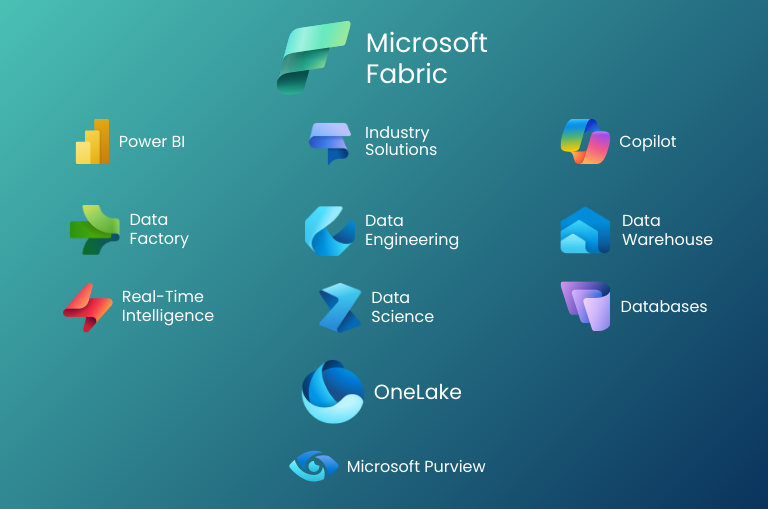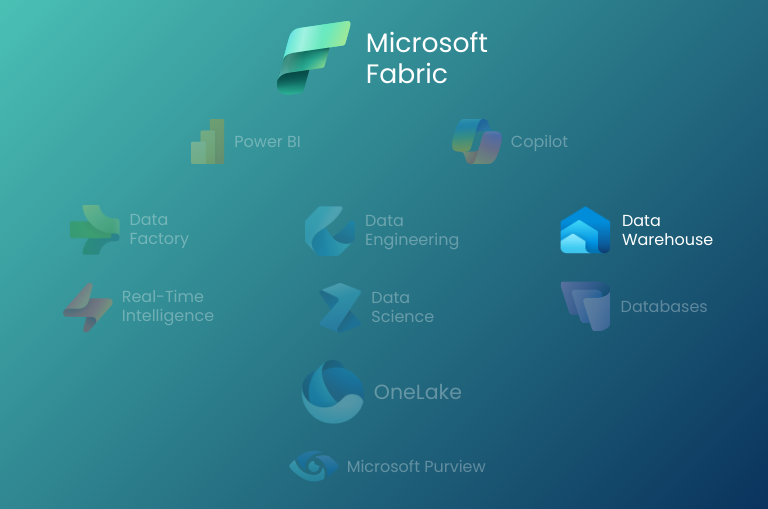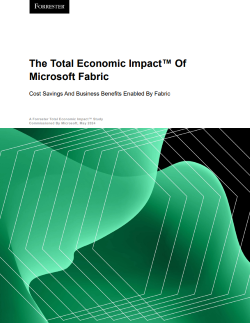What is a Data Warehouse in Microsoft Fabric
AI transformation is revolutionising the way companies operate, and its foundation is data, the fuel that drives intelligent solutions and informed business decisions.
In this complex process, which connects people, data, and technologies, modern tools play a key role. Microsoft Fabric emerges as a comprehensive analytics platform designed to support organisations on this path.
Special attention should be paid to Fabric Data Warehouse, a component created with the challenges of modern analytics in mind. In this article, we will explore its capabilities and show how this modern data warehouse is becoming an essential element of effective AI transformation in enterprises.
What is Microsoft Fabric?
Microsoft Fabric is a comprehensive, integrated data and analytics platform designed for enterprises seeking a simple yet versatile solution for collecting, processing, and analysing information. The platform operates in a SaaS (Software as a Service) model, which ensures ease of use, high scalability, and security.
The key concept of the platform is the unification of resources and services in one coherent environment. Instead of integrating solutions from different vendors, Microsoft Fabric offers a unified cloud-based technology stack on Microsoft Azure that streamlines work for both business teams and IT specialists.
Data in Microsoft Fabric is stored in OneLake, a central repository that eliminates the need to use multiple, often dispersed data stores. This allows companies to manage access more effectively, maintain data consistency, and ensure regulatory compliance.
Built-in artificial intelligence (AI) mechanisms help better understand data and use it in Microsoft Azure AI Services and specific applications, from real-time reporting to advanced machine learning modelling available in Microsoft Azure AI Foundry.
One of the most innovative elements of the platform is Microsoft 365 Copilot, an integral part of Fabric. Copilot is an assistant based on generative artificial intelligence (GenAI) that automates routine tasks, fills in gaps in specialist knowledge, and suggests optimal operations on data. As a result, users can create reports, formulate queries, and implement data engineering processes faster without the need to write complex scripts.
Moreover, Copilot analyses the context of the data and tailors suggestions to specific business needs. As a result, organisations using Microsoft Fabric, supported by Microsoft Copilot, gain an integrated environment for efficiently combining data from various sources such as Microsoft Dynamics 365 Sales, designing advanced analytical pipelines, and leveraging machine learning algorithms as well as ready-made large (LLM) and small (SLM) models in their daily work.
This coherent platform significantly reduces administrative costs, accelerates the implementation of new projects in Power Platform and Microsoft Copilot Studio, and effectively supports teams at every level in making the most of their information potential.
What applications are included in Microsoft Fabric?
Microsoft Fabric is a suite of services with wide-ranging applications throughout the entire data processing and analysis cycle. It offers a unified platform where each component plays a key role in the ecosystem.

This gives companies versatile tools for migrating, managing, and analysing data as well as creating innovative AI solutions.
- Fabric Data Factory - This is a modern tool for integrating and preparing data from various sources. It allows the automation of ETL/ELT processes, task scheduling, and fast transfer of even gigantic volumes of information to target data warehouses. In addition to a rich library of connectors, Data Factory provides mechanisms functional in AI transformation, such as built-in support for intelligent data flows. Thanks to its simple interface, both experienced programmers and business specialists can quickly create data pipelines without the need to write complicated scripts.
- Fabric Data Engineering - A module created for teams specialising in advanced calculations and data engineering. It offers a Spark cluster-based environment, enabling fast processing of massive datasets and integration with other Fabric components. This fosters the creation of scalable machine learning projects, supported by configurable tools and libraries.
- Fabric Data Warehouse - A high-performance data warehouse designed with scalability and flexibility in mind. It allows the separation of computing resources from storage, enabling users to manage performance and costs independently. It supports the native Delta Lake format and integrates seamlessly with other services.
- Fabric Databases - Facilitate the management of relational and custom data structures in a centralised environment. They allow quick replication of data from various sources and consistent scaling for transactional and analytical applications.
- Fabric Data Science - A module that simplifies the design, training, and deployment of machine learning models. It supports integration with Azure Machine Learning and provides a set of tools that facilitate experiments and model lifecycle management.
- Fabric Real-time Intelligence - Provides instant collection and processing of streaming data, enabling real-time event monitoring and log analysis. This allows companies to respond quickly to dynamically changing business conditions based on current data.
- Fabric Power BI - A well-known and valued tool for visualisation and interactive data analysis. In the Fabric environment, it provides easy access to all resources in OneLake, speeding up the creation of reports and dashboards.
- Copilot in Fabric - Copilot is an AI assistant that supports users in automating tasks related to data transformation, cleaning, and modelling. Its ability to generate suggestions and code significantly accelerates the implementation of new analytical processes and learning how to use the platform.
- Fabric OneLake - A central data repository where all files and tables are collected. Thanks to consistent storage, information can be easily shared across different Fabric modules and data duplication can be avoided.
- Microsoft Purview - A comprehensive solution for data governance and security. It allows monitoring the flow of information within Fabric and establishing governance and compliance policies.
- Fabric Industry Solutions - Provides dedicated industry-specific data solutions that form a solid foundation for data management, analysis, and key decision-making. These solutions address the specific challenges of different sectors, enabling companies to optimise processes, combine data from many sources, and use advanced analytical tools.
Microsoft Fabric brings all these areas together into a unified data platform, offering the most comprehensive big data analytics platform in the industry. Fabric enables organisations and individuals to transform large and complex data repositories into actionable workflows and business intelligence.
The future and market of data warehouses and the Delta Lake format
Data warehouses and formats like Delta Lake play a key role in modern analytics platforms, combining the features of traditional data warehouses with the flexibility of data lakes. With such solutions, organisations can efficiently manage massive amounts of data while ensuring their integrity, scalability, and real-time availability.
Data warehouses are evolving toward a lakehouse architecture that integrates the advantages of warehouses and lakes. The Delta Lake format enables data management through ACID transactions, schema enforcement, and the “time travel” feature, which allows access to historical versions of data. With support for both streaming and batch processing, Delta Lake is becoming a standard in modern analytics systems.
-
The data warehouse market will reach USD 69.64 billion by 2029, growing at a CAGR of 16.6% due to the demand for real-time analytics and IoT data processing (Research and Markets).
-
The Delta Lake format improves query performance by 1.7x compared to the traditional Parquet format (Integrate.io).
-
The proliferation of cloud technologies means that 57% of companies consider modernising their data warehouse as key to digital transformation (The Business Research Company).
-
The global data lake market will grow to USD 90 billion by 2032 at a CAGR of 21.3%, driven by increasing demand for scalable analytical solutions (Market.us).
-
By 2025, more than 40% of large enterprises will have implemented AI-driven data lakes to automate data integration and improve query performance (Market.us).
The future of data warehousing and Delta Lake is strongly linked to the growing demand for fast, scalable, and reliable analytical solutions. Investments in these technologies are the foundation for the digital transformation of organizations in the global marketplace.
What is Fabric Data Warehouse
Fabric Data Warehouse is an advanced solution offered by Microsoft Fabric that enables the storage, management, and analysis of large amounts of data in an efficient and scalable way. By separating the compute layer from the storage layer, Data Warehouse allows independent scaling of both components, providing flexibility and cost optimisation.

Key features of Fabric Data Warehouse
-
High SQL performance – Fabric Data Warehouse offers advanced SQL query processing capabilities that ensure fast access to and analysis of data.
-
Scalability – With the ability to independently scale memory and compute power, this solution can grow with business needs.
-
Delta Lake format support – Native storage of data in Delta Lake format allows easy integration of data from various sources and its management.
-
AI integration – Fabric Data Warehouse is designed to integrate with other Microsoft Fabric modules, such as Copilot, enabling AI to automate analyses and generate insights based on collected data.
With these features, Fabric Data Warehouse supports AI processes by providing a solid data foundation on which to build machine learning models and analyze results in real time. Integration with AI tools like Copilot allows for the automation of routine tasks and the provision of intelligent suggestions, accelerating decision-making and increasing operational efficiency.
Who is Fabric Data Warehouse for?
Fabric Data Warehouse is an ideal solution for companies of all sizes that need advanced tools to manage large datasets.
It is intended for data specialists, business analysts, and decision-makers who need reliable and fast information for strategic decision-making.
Thanks to its intuitive interface and advanced features, Data Warehouse is also accessible to users without deep technical knowledge, allowing for broad application across various departments of an organisation.
How to use Fabric Data Warehouse in business?
Fabric Data Warehouse can be applied in business in many ways to increase efficiency and improve decision-making:
-
Sales analysis – Tracking sales trends and identifying the most profitable products in Microsoft Dynamics 365 Sales.
-
Inventory management –Optimising stock levels based on demand forecasts.
-
MMarketing personalisation–A Analysingcustomer data to ccreate personalisedmarketing campaigns in Microsoft Dynamics 365 Customer Insights.
-
Operationsoptimisationn – Monitoring business processes and identifying areas for improvement to enhance customer service quality in Microsoft Dynamics 365 Customer Service.
-
Financial reporting – Automating the generation of financial reports and budget analyses in Microsoft 365 Copilot.
What are the benefits of using Fabric Data Warehouse?
Using Fabric Data Warehouse offers numerous benefits for organisations:
-
Fast access to data – Enables rapid query processing and data analysis.
-
Scalability – Adjust resources to current business needs without additional costs.
-
Integration with Microsoft Fabric – Seamless connection with other platform modules, increasing work efficiency.
-
Data security – Advanced data protection mechanisms ensure security and regulatory compliance.
-
Cost reduction –Optimisation of compute and data storage resources.
What are the benefits of using Fabric Data Warehouse in a company’s AI transformation?
Integrating Fabric Data Warehouse with AI processes in a company brings many advantages:
-
Automation of analyses – AI automates routine analyses, allowing focus on strategic tasks.
-
Better business decisions – Thanks to advanced AI models, the company can make more precise decisions.
-
Faster innovation – AI allows rapid testing and deployment of new analytical solutions.
-
Service personalisation – AI uses data from the data warehouse to create personalised customer offers.
-
Process optimisation – AI identifies and automates the most efficient business processes.
How does the Data Warehouse integrate with other Microsoft Fabric modules?
Data Warehouse is a central element of the Microsoft Fabric ecosystem, enabling easy integration with other platform modules. Thanks to OneLake, a unified data store, the Data Warehouse can work seamlessly with tools such as Power BI, Data Factory, or Real-Time Intelligence.
This integration ensures data consistency, facilitates its management and analysis, and enables the use of advanced AI functions, such as Copilot, to automate and optimise analytical processes.
This allows users to use comprehensive solutions without having to switch between different systems, significantly increasing work efficiency and reducing the time needed to implement new projects.
Return on investment of implementing the unified Microsoft Fabric data platform
 The Forrester report The Total Economic Impact™ Of Microsoft Fabric (TEI) shows that Microsoft Fabric delivers 379% return on investment (ROI) over three years with 9.79 million USD NPV. Analysing a company with revenues of 5 billion USD, Fabric increased data engineer productivity by 25% (1.8 million USD savings), increased business analyst efficiency by 20% (4.8 million USD savings) and generated 3.6 million USD in profits through better decisions.
The Forrester report The Total Economic Impact™ Of Microsoft Fabric (TEI) shows that Microsoft Fabric delivers 379% return on investment (ROI) over three years with 9.79 million USD NPV. Analysing a company with revenues of 5 billion USD, Fabric increased data engineer productivity by 25% (1.8 million USD savings), increased business analyst efficiency by 20% (4.8 million USD savings) and generated 3.6 million USD in profits through better decisions.
Infrastructure savings reached 779 thousand USD, and employee retention improved by 8%. The unified platform integrates data engineering, storage, science, and real-time analytics, eliminating silos. The SaaS model and intuitive interface enable data availability across the organisation, supporting data-driven strategies, according to the Forrester TEI study commissioned by Microsoft.
Summary
Microsoft Fabric Data Warehouse is a powerful tool that can revolutionise the way companies manage their data. With advanced features such as high SQL performance, scalability, and native Delta Lake format support, Data Warehouse enables efficient storage and analysis of large datasets.
Integration with other Microsoft Fabric modules, such as Power BI or Microsoft Copilot, allows for the creation of advanced analytical solutions and process automation through AI.
For companies that want to leverage the potential of their data fully, Microsoft Fabric Data Warehouse offers not only a storage tool but also a platform for transforming data into valuable business insights. This allows organisations to make more informed decisions, optimise their operations, and innovate faster than ever before.
In an era of dynamic market changes and growing competition, having a solid data foundation is key to the success of any enterprise. Implementing Microsoft Fabric with Data Warehouse, together with the implementation of Microsoft Power BI and Microsoft 365 Copilot, creates an integrated ecosystem and data foundation for analytics and AI. Fabric provides this foundation, supporting companies on their path to digital transformation and the practical, sustainable use of AI.

